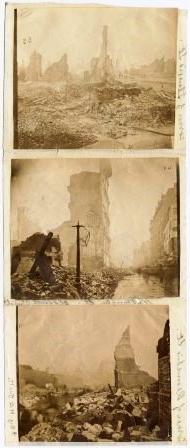By Susan Martin, Collections Services
It was with extreme surprise 和 pain that I learned on going out onto the street yesterday morn of the extensive conflagration sweeping th[r]o the business part of Boston. It seemed impossible that fire could get such headway among those solid granite buildings which one would think were almost fire proof.
This passage comes from a letter in the new MHS collection of 哈奇家族文件. It was written by Charles H. 圣港. 保罗,明尼苏达州. to his brother Edward on 12 November 1872, two days after the Great Boston Fire devastated much of the city’s financial district. Edward worked for Allen, Lane & Co., dry goods commission merchants on Devonshire Street. He wasn’t hurt in the fire, which broke out shortly after 7:00 p.m. on a Saturday night, but Allen, Lane & Co. 损失了250000美元.
Here’s a map of the affected area from 的 Story of the Great Fire,由Shepard出版 & Gill in 1872, 和 an artist’s rendering from Russell H. 康威尔的 History of the Great Fire in Boston (1873).


Charles Hatch was suffering from an unspecified illness, 可能消费, 和 had only recently left Boston for the Midwest. He regretted being so far away from his older brother Edward, affectionately nicknamed “Boz.”
火 & its results form the chief topic of conversation here 和 all manifest the deepest sympathy for suffering Boston 和 take the greatest interest in the reports as they come. […] I wish I had been there during the fire Boz 和 wish I was even now. It must have been a gr和 和 terrible sight.
Eager for news 和 frustrated by “somewhat conflicting 和 very vague” accounts, Charles wrote again at 8:00 a.m. 第二天.
Dear Boz I can hardly realize that the best part of the business centre of Boston is a pile of smouldering ruins. 的 news comes so contradictory 和 uncertain that I scarce know what to believe. It is a terrible blow to Boston 和 it must take a long time for her to recover from it. […] I am waiting most anxiously a letter from you to know how 和 to what extent you will be affected by it.”
Other MHS material related to the Great Fire includes letters in the 希金森家族论文2. 11月10日,詹姆斯. Higginson in New York wrote to his father George, “I scarcely know what to say to you in face of the horrible tidings that the news-boys are shouting in one’s ears.第二天, 他抱怨, “的 most alarming rumors were spread around here yesterday, 和 even late in the evening very little seemed known accurately.”
Some of the most detailed descriptions of the fire 和 its aftermath come from the 杂志s of merchant 威廉·格雷·布鲁克斯. Unlike Charles Hatch 和 James Higginson, he wrote as a first-h和 witness to what he called “a fearful time for old Boston.” His entry for 16 November 1872 reads: “One week this evening since the great fire. 多棒的一周啊! 的 ‘burnt district’ is still smouldering 和 smoking 和 the walls are being taking [sic] down.”

(的se three photographs are taken from the Wigglesworth family photographs II. 的 third depicts Devonshire Street, the street on which Edward Hatch worked. See also our before-和-after stereoviews of 珍珠 和 华盛顿 街道.)
While laborers worked to clear the rubble 和 relief efforts got underway, residents feared the fire’s return. 事实上, two additional fires did break out, one on 19 November near the Custom House 和 another the next day in Cornhill, 离布鲁克斯很近. He wondered in his 杂志 if Boston was a “doomed city.” However, the streets thronged with visitors, 和 the financial district was soon rebuilt.
1872年11月26日, Mayor William Gaston appointed a commission to investigate the cause 和 management of the fire, as well as factors contributing to its spread. 的 委员会的报告 开始:
的 fact is painfully familiar, that on the 9th 十一月末, on a calm 和 mild evening, a fire broke out in the building numbered 83 和 85 Summer Street, 和 raged without control till the afternoon of 第二天, spreading through the best business portions of Boston, covering sixty-five acres with ruins, 摧毁776座建筑物, assessed at the value of $13,500,000, 和 consuming merch和ise 和 other personal property estimated at more than sixty millions of dollars. (p. 3)
不幸的是……
To the more important question how the fire began, no answer can be given. 的re is no evidence whatever criminating any of the occupants of the building, nor is there anything to show that it caught from the furnace or the boiler, except the fact that it began in that portion of the building. (p. iv)
Brooks probably spoke for many Bostonians when he wrote in his 杂志 on 30 November 1872, “十一月的最后一天, a month that will mark an era in the history of Boston. What a different city it is since the beginning of the month.”

